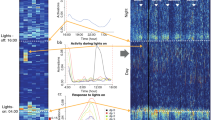Abstract
CERTAIN rodents (as also is the case with man) show circadian (about 24-h; circa, dies1–3) rhythms in many body functions. Prominent among these rhythms is the adrenal cycle, gauged indirectly by observations on functions influenced by corticosteroids4,5 and directly by determinations of corticosterone in serum6–9 and in the adrenal gland itself10. Investigations of an indirect index, the blood eosinophil rhythm, suggested that the adrenal cycle persists in mice kept under conditions which gravely alter the œstrus cycle, such as the prolonged 50 per cent reduction in dietary calories11. This communication summarizes shorter-term work with a more direct index, that is, the level of corticosterone in serum and adrenals. Circadian periodic changes in these indices as well as in rectal temperature and pinnal mitoses continue in C mice deprived of all food and water for 36 h.
This is a preview of subscription content, access via your institution
Access options
Subscribe to this journal
Receive 51 print issues and online access
$199.00 per year
only $3.90 per issue
Buy this article
- Purchase on Springer Link
- Instant access to full article PDF
Prices may be subject to local taxes which are calculated during checkout
Similar content being viewed by others
References
Halberg, F., Perspectives in Biology and Medicine, 3, 491 (1960).
Pittendrigh, C. S., in Cold Spring Harbor Symp. Quant. Biol., 159 (Long Island Biol. Assoc., New York, 1960).
Aschoff, J., Handbuch der Zoologie, 8, 199 (1962).
Halberg, F., Visscher, M. B., and Bittner, J. J., Amer. J. Physiol., 174, 313 (1953).
Brown, H. E., and Dougherty, T. F., Endocrinol., 58, 365 (1956).
Halberg, F., Barnum, C. P., Silber, R. H., and Bittner, J. J., Proc. Soc. Exp. Biol. Med., 97, 897 (1958).
Halberg, F., Peterson, R. E., and Silber, R. H., Endocrinol., 65, 222 (1959).
Guillemin, R., Dear, W. E., and Liebelt, R. A., Proc. Soc. Exp. Biol. Med., 101, 394 (1959).
McCarthy, J. L., Corley, R. C., and Zarrow, M. X., Proc. Soc. Exp. Biol. Med., 104, 787 (1960).
Halberg, F., Albrecht, P. G., and Bittner, J. J., Amer. J. Physiol., 197, 1083 (1959).
Halberg, F., and Visscher, M. B., Endocrinol., 51, 329 (1952).
Silber, R. H., Busch, R. D., and Oslapas, R., Clin. Chem., 4, 278 (1958).
Chossat, C., Mem. Acad. Roy. Sci. de l'Institut de France, 8, 438 (1843).
Schmidt-Nielsen, B., The Physiologist, 1, 4 (1958).
Haus, E., Hanton, E. M., and Halberg, F., The Physiologist, 2, 54 (1959).
Author information
Authors and Affiliations
Rights and permissions
About this article
Cite this article
GALICICH, J., HALBERG, F. & FRENCH, L. Circadian Adrenal Cycle in C Mice kept without Food and Water for a Day and a Half. Nature 197, 811–813 (1963). https://doi.org/10.1038/197811a0
Issue Date:
DOI: https://doi.org/10.1038/197811a0
This article is cited by
-
Periodicity analysis A potential tool for biometeorologists
International Journal of Biometeorology (1963)
Comments
By submitting a comment you agree to abide by our Terms and Community Guidelines. If you find something abusive or that does not comply with our terms or guidelines please flag it as inappropriate.



